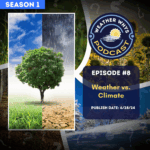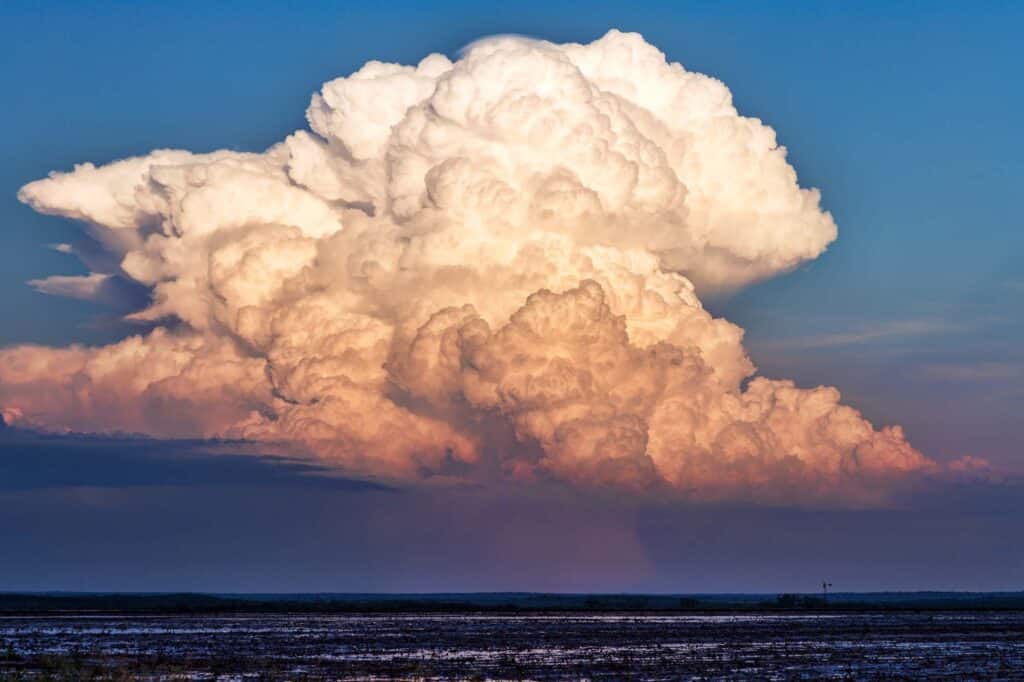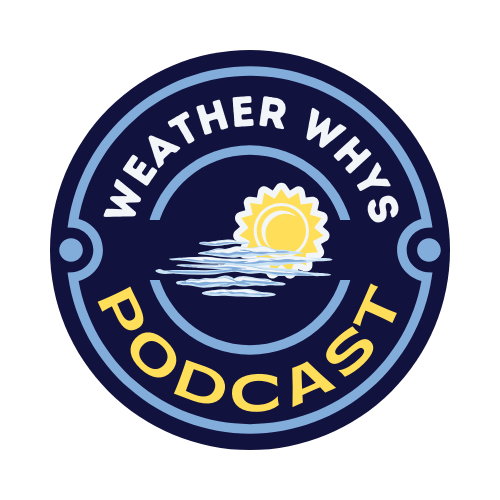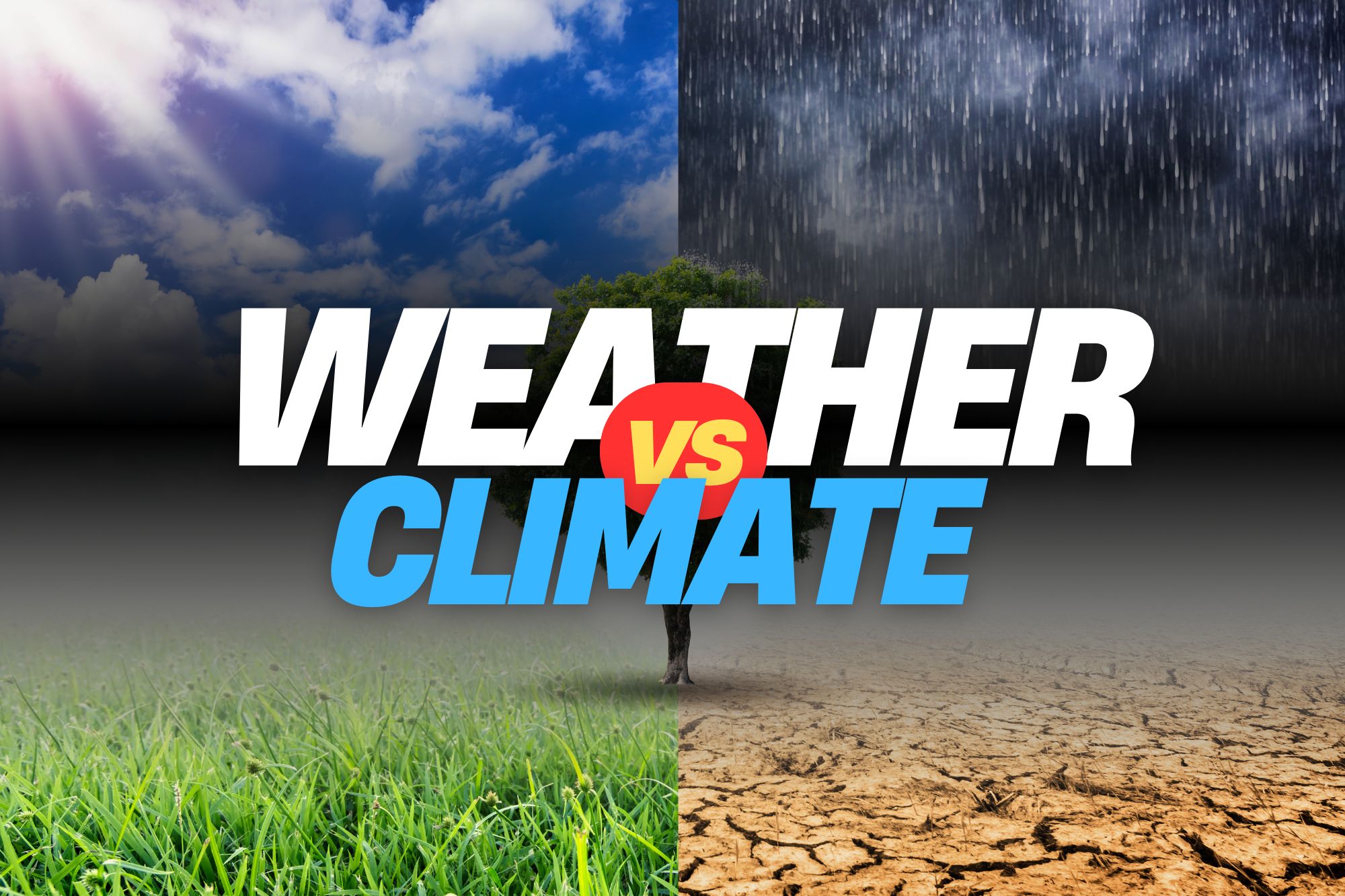
/
RSS Feed
In this episode of The Weather Whys Podcast, we explain the often misunderstood differences between weather vs climate. Weather refers to short-term atmospheric conditions that change frequently, while climate represents long-term patterns over decades or centuries. Ed highlights how weather impacts daily life, how climate influences long-term planning, and global issues like climate change.

To review, weather vs climate:
- Weather is the short-term
- Climate is the long-term
[00:00:00] Welcome to another episode of The Weather Whys podcast, where we answer the whys and whats of weather. I’m your host, Ed Oswald, and today, we’re unraveling the often misunderstood difference between weather and climate, if you’re a weather enthusiast, or just curious about our planet, this episode is for you.
[00:00:16] Thanks for joining us. So, what is weather? In simple terms, weather refers to the short term atmospheric conditions we experience on a day to day basis. Think about the temperature, humidity, precipitation, wind, and visibility you encounter every time you step outside.
[00:00:35] Weather is highly variable, and can change from sunny to stormy in a matter of minutes.
[00:00:41] Climate represents the long term patterns of weather in a particular area. When we talk about climate, that’s the average conditions and trends over decades, even centuries. For instance, the National Weather Service averages temperature and precipitation records over 30 year periods to determine the climate normals for a location.
[00:00:57] Time is a key difference between weather and climate. Weather is all about the short term, minutes to weeks. It’s the rainstorm that ruins your picnic, or the heatwave that has everyone flocking to the beach.
[00:01:08] Climate, however, is the long term picture, encompassing years to millennia. It’s the gradual shift in seasonal patterns, or the stable average temperatures you can expect over decades.
[00:01:19] Weather is also variable. One day it’s sunny and people are outside enjoying it. The next day it rains.
[00:01:26] On the other hand, climate is relatively stable and changes slowly over long periods. We measure weather with instruments like weather stations and satellites. Climate is analyzed using historical data, climate models, and long term trends to understand the patterns.
[00:01:40] That’s still pretty technical, so let’s look at some real world examples. Weather is what you experience when a thunderstorm rolls through. It’s immediate, it’s tangible, and it directly affects your daily life. Should you carry an umbrella, wear a jacket, or reschedule that outdoor event?
[00:01:57] Now, consider a Mediterranean climate.
[00:01:58] It’s characterized by hot, dry summers and mild, wet winters. This climate pattern influences everything from the types of crops grown to the architecture of homes designed to stay cool in the heat.
[00:02:09] Understanding these patterns helps us plan for agriculture, manage water resources, and adapt to seasonal changes.
[00:02:15] Understanding weather is crucial for our daily lives. It helps us plan our activities, stay safe during extreme events, and make informed decisions based on short term forecasts. On the flip side, understanding climate is vital for long term planning.
[00:02:29] It impacts our agriculture, conservation efforts, and policy making. In the context of global issues like climate change, grasping the difference between weather and climate is essential. It helps us appreciate the urgency of sustainable practices and the need for informed environmental policies.
[00:02:44] One question you may have is if weather isn’t climate, then how does climate change affect weather?
[00:02:51] It’s important to remember in this context that a changing climate also means changing weather patterns. Climate change doesn’t just make a strong hurricane even stronger, but leads to long term changes in all kinds of weather.
[00:03:04] Often we focus on the most extreme weather events as evidence, but there’s proof of it in everyday weather.
[00:03:09] For example, research has shown that heavy rainfall events have become more common, and nighttime temperatures are trending warmer. Those long term changes in how the climate operates trickles down into individual weather events.
[00:03:21] We hope our explanation of these two often confused terms, helped you understand the difference. But that’s all the time we have for today’s topic. Check our show notes for more resources to learn more.
[00:03:32] Before we go, we wanted to quickly remind everyone that Prime Day is coming up. If you’re looking for a home weather station, this is a great time to pick one up. Be sure to follow us at the Weather Station Experts. That’s all one word on YouTube, Pinterest and TikTok on Instagram and now Threads. We’re at weather station experts. We’ll be on YouTube and TikTok frequently, so be sure to follow so you don’t miss any of the deals.
[00:03:56] We’ll also have a special episode of the WeatherWise podcast the Friday before Prime Day.
[00:04:01] Prime Day has just been announced as July 16th and 17th, so that episode will
[00:04:05] be on Friday, July 12th. You can visit our deals pagee using the short link. W x l dot i n k forward slash w w prime day all one word.
[00:04:17] We’ll include that link in the show notes. Thanks for joining us.
[00:04:22] Weather Whys is a production of the Weather Station Experts and the Weather Whys Company. Today’s episode was produced by Derek Oswald and myself from our studios here in West Lawn, Pennsylvania. If you’d like to learn more about Weather Whys, please visit our website at weatherwhys that’s W H Y S dot show.
[00:04:41] Our website has links to this episode and past episodes.
[00:04:44] We’d also love to hear from you. You can email us at podcast@theweatherstationexperts.com. We may respond to your comments in a future podcast. Don’t forget to subscribe wherever you listen to podcasts. Again, thanks for listening, and as always, stay weather wise.
[00:00:16] Thanks for joining us. So, what is weather? In simple terms, weather refers to the short term atmospheric conditions we experience on a day to day basis. Think about the temperature, humidity, precipitation, wind, and visibility you encounter every time you step outside.
[00:00:35] Weather is highly variable, and can change from sunny to stormy in a matter of minutes.
[00:00:41] Climate represents the long term patterns of weather in a particular area. When we talk about climate, that’s the average conditions and trends over decades, even centuries. For instance, the National Weather Service averages temperature and precipitation records over 30 year periods to determine the climate normals for a location.
[00:00:57] Time is a key difference between weather and climate. Weather is all about the short term, minutes to weeks. It’s the rainstorm that ruins your picnic, or the heatwave that has everyone flocking to the beach.
[00:01:08] Climate, however, is the long term picture, encompassing years to millennia. It’s the gradual shift in seasonal patterns, or the stable average temperatures you can expect over decades.
[00:01:19] Weather is also variable. One day it’s sunny and people are outside enjoying it. The next day it rains.
[00:01:26] On the other hand, climate is relatively stable and changes slowly over long periods. We measure weather with instruments like weather stations and satellites. Climate is analyzed using historical data, climate models, and long term trends to understand the patterns.
[00:01:40] That’s still pretty technical, so let’s look at some real world examples. Weather is what you experience when a thunderstorm rolls through. It’s immediate, it’s tangible, and it directly affects your daily life. Should you carry an umbrella, wear a jacket, or reschedule that outdoor event?
[00:01:57] Now, consider a Mediterranean climate.
[00:01:58] It’s characterized by hot, dry summers and mild, wet winters. This climate pattern influences everything from the types of crops grown to the architecture of homes designed to stay cool in the heat.
[00:02:09] Understanding these patterns helps us plan for agriculture, manage water resources, and adapt to seasonal changes.
[00:02:15] Understanding weather is crucial for our daily lives. It helps us plan our activities, stay safe during extreme events, and make informed decisions based on short term forecasts. On the flip side, understanding climate is vital for long term planning.
[00:02:29] It impacts our agriculture, conservation efforts, and policy making. In the context of global issues like climate change, grasping the difference between weather and climate is essential. It helps us appreciate the urgency of sustainable practices and the need for informed environmental policies.
[00:02:44] One question you may have is if weather isn’t climate, then how does climate change affect weather?
[00:02:51] It’s important to remember in this context that a changing climate also means changing weather patterns. Climate change doesn’t just make a strong hurricane even stronger, but leads to long term changes in all kinds of weather.
[00:03:04] Often we focus on the most extreme weather events as evidence, but there’s proof of it in everyday weather.
[00:03:09] For example, research has shown that heavy rainfall events have become more common, and nighttime temperatures are trending warmer. Those long term changes in how the climate operates trickles down into individual weather events.
[00:03:21] We hope our explanation of these two often confused terms, helped you understand the difference. But that’s all the time we have for today’s topic. Check our show notes for more resources to learn more.
[00:03:32] Before we go, we wanted to quickly remind everyone that Prime Day is coming up. If you’re looking for a home weather station, this is a great time to pick one up. Be sure to follow us at the Weather Station Experts. That’s all one word on YouTube, Pinterest and TikTok on Instagram and now Threads. We’re at weather station experts. We’ll be on YouTube and TikTok frequently, so be sure to follow so you don’t miss any of the deals.
[00:03:56] We’ll also have a special episode of the WeatherWise podcast the Friday before Prime Day.
[00:04:01] Prime Day has just been announced as July 16th and 17th, so that episode will
[00:04:05] be on Friday, July 12th. You can visit our deals pagee using the short link. W x l dot i n k forward slash w w prime day all one word.
[00:04:17] We’ll include that link in the show notes. Thanks for joining us.
[00:04:22] Weather Whys is a production of the Weather Station Experts and the Weather Whys Company. Today’s episode was produced by Derek Oswald and myself from our studios here in West Lawn, Pennsylvania. If you’d like to learn more about Weather Whys, please visit our website at weatherwhys that’s W H Y S dot show.
[00:04:41] Our website has links to this episode and past episodes.
[00:04:44] We’d also love to hear from you. You can email us at podcast@theweatherstationexperts.com. We may respond to your comments in a future podcast. Don’t forget to subscribe wherever you listen to podcasts. Again, thanks for listening, and as always, stay weather wise.
This is also available as a video from our YouTube channel!
You also might want to watch this video on the Milankovitch Cycle.
Key Points
- 00:00 Introduction to The Weather Whys Podcast
- 00:22 Defining Weather: The Short-Term Atmospheric Conditions
- 00:41 Understanding Climate: The Long-Term Weather Patterns
- 00:58 Key Differences Between Weather and Climate
- 01:41 Real-World Examples of Weather and Climate
- 02:15 The Importance of Understanding Weather and Climate
- 02:44 Climate Change and Its Impact on Weather
- 03:22 Conclusion and Additional Resources
- 03:33 Prime Day Announcement and Special Episode
- 04:20 Closing Remarks and Contact Information
Learn more about the differences between weather vs climate
- https://www.climate.gov/ – Please note this has been affected by the President’s EO regarding climate 🙁

